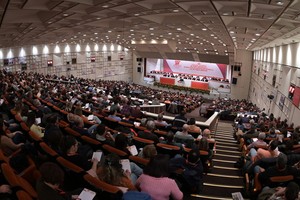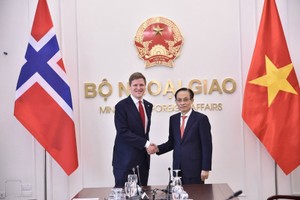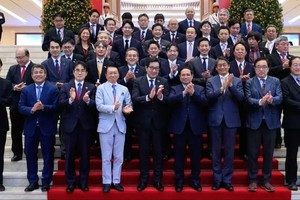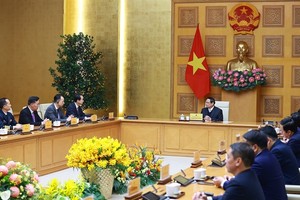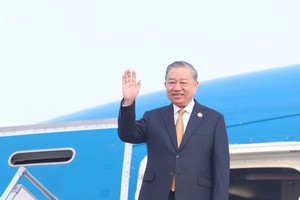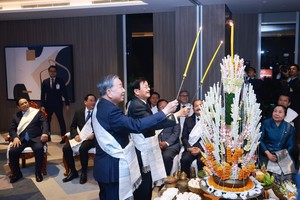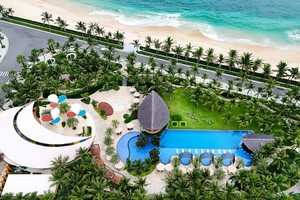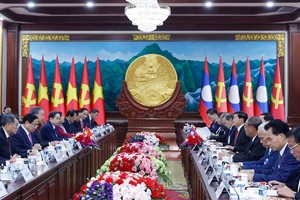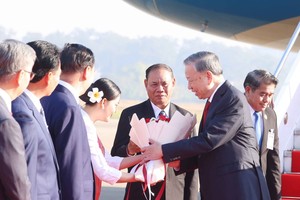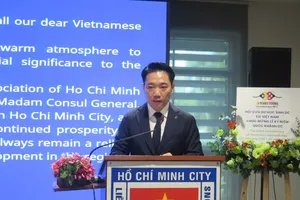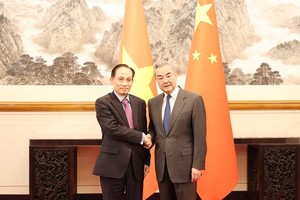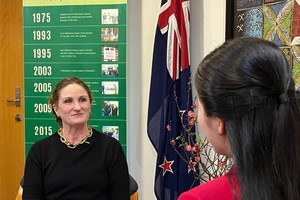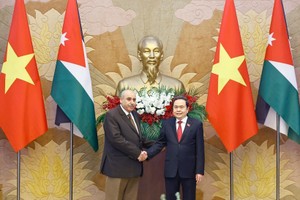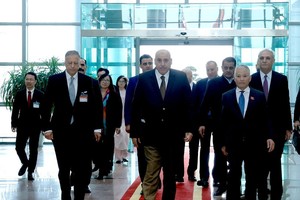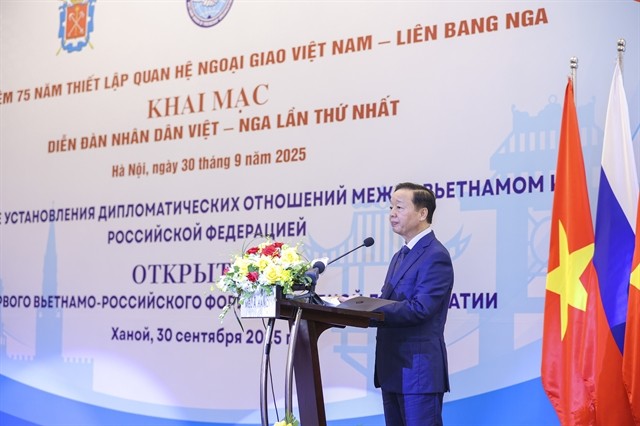
Deputy Prime Minister Tran Hong Ha highlighted the significance of the inaugural forum, praising the initiative of the Vietnam Union of Friendship Organisations and the friendship associations of both nations.
"The forum is not only a vivid testament to the vitality of our friendship, but also a new, effective and regular dialogue mechanism", he said.
Phan Anh Son, President of the Vietnam Union of Friendship Organisations, noted that the forum coincides with the 75th anniversary of diplomatic relations between the two countries (January 30, 1950–2025), marking an important milestone.
The gathering aims to reflect on 75 years of solidarity, affirm the core values underpinning the Vietnam–Russia relationship, explore ways to promote people-to-people exchange, mutual understanding and cooperation between organisations, businesses and associations, and discuss areas of current and potential collaboration, including science, healthcare, trade, tourism, culture and education.
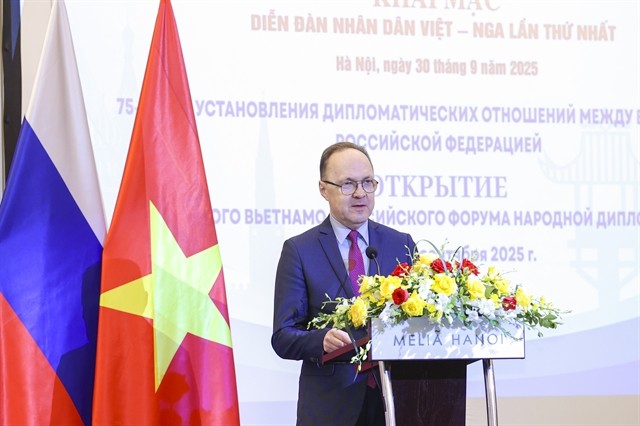
Russian Ambassador to Vietnam G S Bezdetko welcomed the forum, saying it would help sustain the atmosphere of friendship, trust and mutual understanding between the peoples of both nations.
He hopes the discussions within the forum will achieve many results, establish new relationships and open up joint cooperation initiatives.
Grigoryev Evgeny Dmitrievich, a member of the Saint Petersburg city government and chairman of its Committee for External Relations, said that in August 2020, by the decision of Governor Alexander Beglov, Vietnam was recognised as one of the priority directions in the city's foreign affairs.
“Our goal is to strengthen connections not only at government level but also among citizens, organisations and youth,” he said.
It is people-to-people diplomacy that can make an important contribution to building bridges of understanding and respect between the people of the two countries.
Exchange activities between people, artists, intellectuals and social organisations have created a special atmosphere of trust and openness.
"Not only through festivals and exhibitions, but also through daily contacts that help us better understand each other's identity and life," he added.
This also helps to establish business relations, promote tourism, organise humanitarian and volunteer activities, and support the study of Russian in Vietnam and Vietnamese in Russia.
Looking ahead, Grigoryev emphasised the need for effective mechanisms for information exchange, long-term cooperation programmes and broader engagement in fields such as economy, environment, healthcare and social services.
He also hopes that the forum will become a new milestone in bilateral relations, opening greater space for creativity, enterprise and practical initiatives.
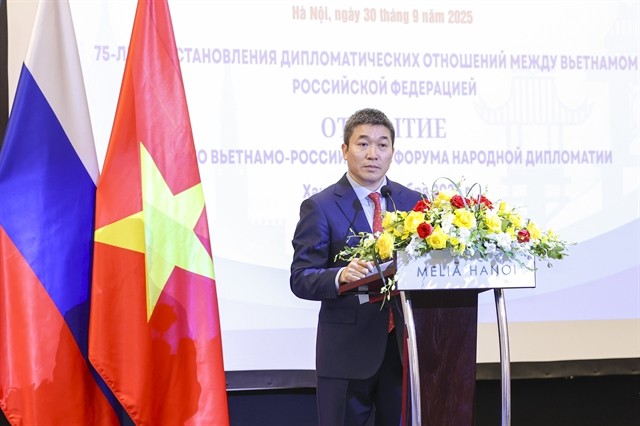
A special relationship
Deputy PM Tran Hong Ha said "The enduring bond between Vietnam and Russia is a special relationship, steeped in history and strengthened through the test of time, nurtured by generations of leaders and citizens from both countries".
He recalled that the relationship took root early, when revolutionary leader Nguyen Ai Quoc, later known as President Ho Chi Minh, found in the Russian October Revolution "a path of liberation for nations and all humanity".
During Vietnam’s most perilous struggle for survival against French colonialism, the Soviet Union became one of the very first countries to recognise the Democratic Republic of Vietnam and establish diplomatic relations on January 1, 1950.
“That courageous decision broke the siege of isolation, delivered an invaluable political victory and encouraged Vietnam towards decisive triumphs both militarily and diplomatically,” Mr. Tran Hong Ha said.
From that foundation, the wholehearted support of the Soviet people became inseparable from Vietnam’s cause of national defence.
Generations of Vietnamese remain deeply grateful to the Soviet experts and soldiers who stood shoulder to shoulder with them, contributing their knowledge and, in many cases, their blood and youth to Vietnam’s independence, he said.
Vietnam also takes pride in its own soldiers who fought bravely in the ranks of the Red Army against fascism.
The friendship – forged in wartime – has continued to shine in peace and reconstruction, he added.
Across Vietnam, reminders of Russian solidarity remain visible, from iconic landmarks such as Thăng Long Bridge in Hanoi and Hoa Binh Hydropower Plant to long-standing energy partnerships like Vietsovpetro and Rusvietpetro.
These ventures have not only fuelled industrial development but also stood as enduring symbols of the Vietnam–Russia bond.
Today, cooperation continues to expand across diverse fields. Vietnamese enterprises, including TH True Milk with its US$2.7 billion investment project in Russia, are writing new success stories, contributing to Russia’s economy while deepening the comprehensive partnership.
Expanding opportunities
Mr. Tran Hong Ha said that opportunities for cooperation remain vast between the two countries.
The strategic directions, set out during recent landmark visits by Russian President Vladimir Putin in June 2024 and by Party General Secretary To Lam in May 2025, will serve as guiding frameworks to turn potential into tangible results.
In terms of economy, the two countries will fully harness the Free Trade Agreement between Vietnam and the Eurasian Economic Union, boosting bilateral trade to new heights and pursuing investments building on the success of joint ventures such as Vietsovpetro and Rusvietpetro and projects of Vietnamese businesses in Russia.
In terms of energy and science-technology, the two countries will extend oil and gas partnerships while advancing into renewable energy and developing the planned Nuclear Science and Technology Centre, seen as a new symbol of deepened cooperation. Joint research bodies, notably the Vietnam-Russia Tropical Center, will remain key pillars.
In terms of defence and security, the two countries reaffirmed this as a highly trusted and special area of cooperation, not aimed at any third party but contributing to peace and stability.
